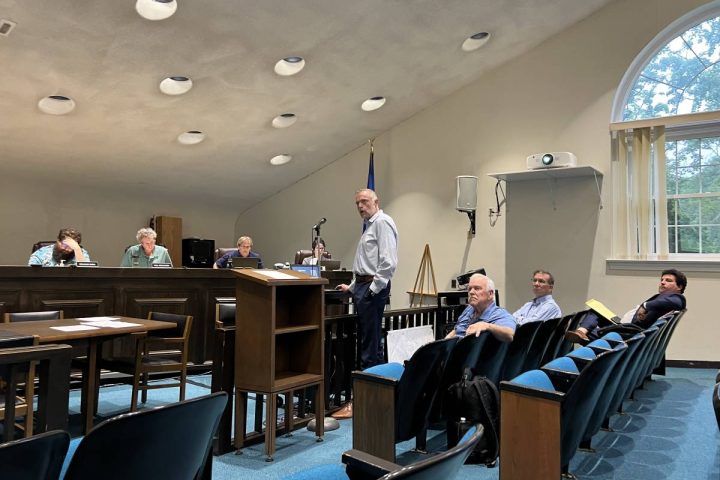BRIDGEPORT, CT — A developer plans to resolve wetlands violations at 64 Cambridge and 4 Independence drives, two adjacent industrial properties in Monroe, by restoring wetlands damaged by a quarrying operation and to truck in over 27,000 dump truck loads of material to fill a massive hole it left behind.
Town land use approvals allowed the work, but a neighboring property owner, citing environmental concerns over the site’s close proximity to the Pequonnock River watershed, filed an appeal at Fairfield District Superior Court in Bridgeport.
On Thursday, Judge Dale W. Radcliffe’s ruling upheld the Inland Wetlands Commission’s approval of the environmental remediation and wetlands restoration plan, but overturned the Planning and Zoning Commission’s approval of an excavation and fill permit.
Peter Metropoulos, trustee to The Thomas C. and Stella Maganas 1988 Family Trust, the owner of 36 Timothy Hill Road in Monroe, had filed the appeals.
“I am very happy with Judge Radcliffe’s decision, but I suspect this issue is far from over,” he said. “My basic concerns have been consistently focused on protecting the local groundwater of the state of Connecticut from any unnecessary pollution. The disagreement I have with Mr. Karp will continue until all illegally imported construction debris is removed from this site.”
The owner of the industrial properties points to soil testing, in which no contaminants were found.
Arnold Karp, managing partner of Astro Land Holdings LLC and Spacely Land Holdings LLC, which own the industrial sites, has said restoring the wetlands will address past violations and make way for commercial buildings, providing positive tax revenue for the town.
“We are still reviewing and will confer with our attorneys and the town’s attorney,” Karp said after Thursday’s ruling. “We look forward to resolving any outstanding issues.”
Metropoulos was represented by Attorney Joel Z. Green, who was assisted by Attorney Linda Laske.
The co-defendants, which included Monroe’s town boards, were represented by the developer’s attorneys, Stephen A. Finn and Zachary J. Phillipps, and Monroe’s land use attorney, Barbara Schellenberg.
‘No specific criteria’
Radcliffe’s entire ruling can be downloaded by clicking here. But the rationale for his decision to uphold the appeal of the Planning and Zoning Commission’s excavation and fill permit is summarized below.
Radcliffe found the waivers issued as part of the permit were not valid, because section 6.4.23 of the Monroe Zoning Regulations, which the Planning and Zoning Commission based its decision on, provide no specific criteria to allow a waiver.
According to the court ruling:
[Metropoulos] argues that the Commission has no authority pursuant to the General Statutes, to waive standards contained in the Regulations on a case-by-case basis. Waivers approved consistent with Section 6.4.23 of the Monroe Zoning Regulations, he maintains, are invalid and violate the uniformity provision found in General Statutes Section 8-2.
The Plaintiff insists that Section 6.4.23, the provision in the Monroe Zoning Regulations which allows for the waivers, contains no definite standards, and represents an improper exercise of authority by the Monroe Planning and Zoning Commission.
“Section 8-2 of the General Statutes authorizes a municipal planning and zoning commission to enact regulations, with the proviso that ‘all such regulations shall be uniform for each class or kind of building, structure, or uses of land throughout each district.'”
It says “the purpose of the uniformity requirement … is to ensure all property owners that there will be no improper discrimination, and that all owners of the same class, in the same district, shall be treated alike.” — Kaufman v. Zoning Commission, 232 Conn. 122, 143 (1995).
The judge cites the Monroe case, “MacKenzie v. Planning & Zoning Commission, in which an “Appellate Court observed that no provision in the General Statutes permits a zoning commission to vary the terms of its regulations on a case-by-case basis within a given district.”
The court also noted the power to provide elasticity in zoning regulations is given by statute to the zoning board of appeals.
In the current case, “the only criteria contained in the Regulation, is a finding that the result is ‘no less protective of the environment,’ or is not ‘inconsistent with the intent and purposes of the regulations,” according to Radcliffe’s decision.
Using more cases as precedent, the judge wrote, “this broad language, coupled with an absence of any specific criteria, permits disparate results and inconsistent conclusions, unencumbered by definite standards which must be met prior to granting of a waiver. Overly elastic regulations fail to inform applicants of what must be submitted and fail to ensure equal treatment for all who are similarly situated.”
In the case of Santarsiero v. Planning & Zoning Commission, which concerned the same Monroe property as MacKenzie, the regulation provided that a landscape buffer requirement could be waived in two specific instances: where natural vegetation formed an effective buffer or the area is an inland wetland.
In those instances, three rows of evergreen trees, planted 15 feet apart, would not be mandated.
“No such limitations or prerequisites limit the granting of waivers pursuant to Section 6.4.23 of the Regulations,” Ratcliffe wrote. “Therefore, the Plaintiff’s appeal of the granting of the Excavation/Filling Permit must be sustained.”
All respectful comments with the commenter’s first and last name are welcome.






